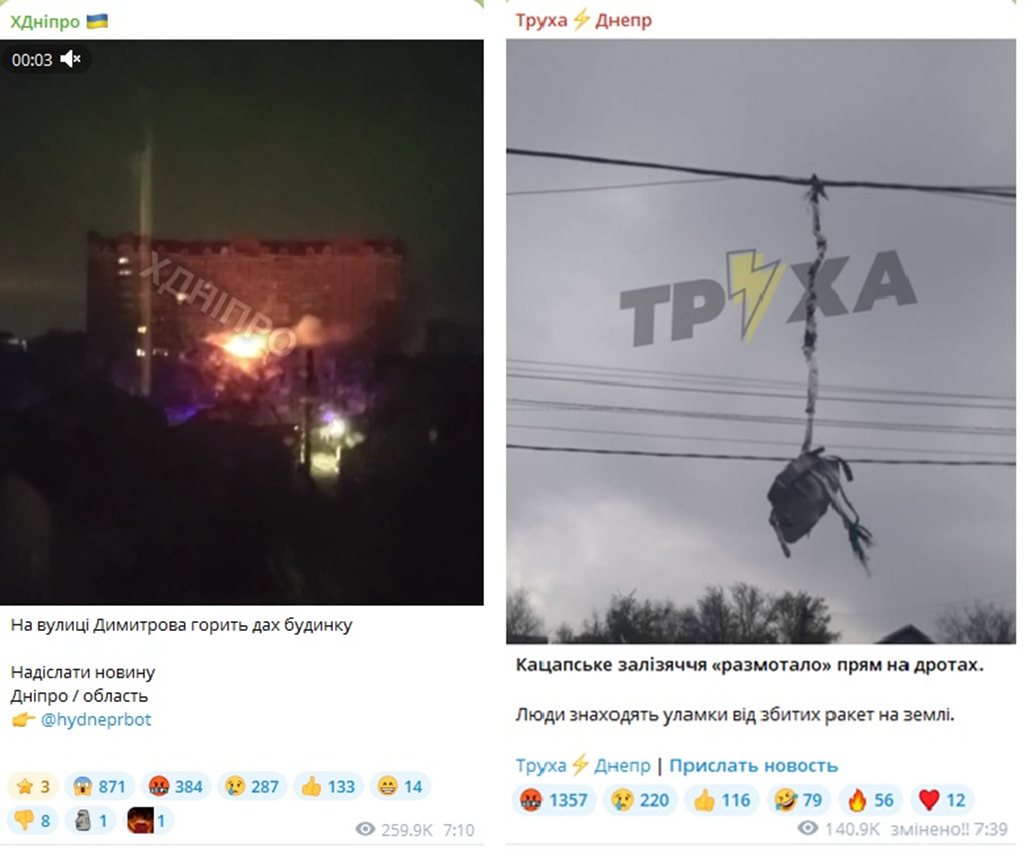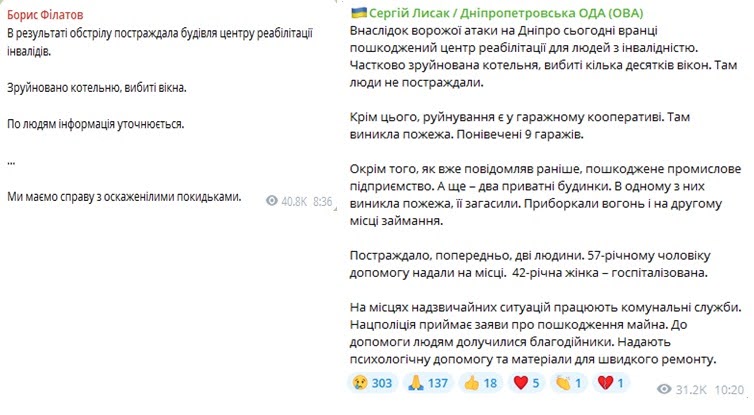The Dnipro oblast military administration banned journalists from filming the aftermath of the Russian shelling strike on the city on November 21. The media only received permission to work at the shelling sites five hours later, even though anonymous Telegram channels were already actively sharing photos and videos of the shelling results, reports Kateryna Lysiuk, the regional representative of the Institute of Mass Information.
The IMI representative notes that after a series of explosions that occurred in the city at 5:00 a.m. and 7:00 a.m. and the requests by journalists in a group chat to film the affected sites, the Dnipropetrovska OMA spokeswoman Natalia Ohorodnya said, “Dear colleagues, for now we observe media silence. Thank you for your understanding.”

While official media had to remain silent, anonymous Telegram channels were posting photos and videos of the Dnipro shelling aftermath. Screenshots from anonymous Telegram channels. Collage by the IMI
Dnipro media outlets were only permitted to work at the shelling sites after Dnipro Mayor Borys Filatov reported damage to civilian infrastructure on Telegram and two posts by the chair of the Dnipropetrovska OMA, Serhiy Lysak.

Screenshots from official Telegram channels of the Dnipro Mayor and the Dnipropetrovska OMA chair. Collage by the IMI
“After Dnipro survived a strike with what apparently was a new type of intercontinental ballistic weapon, we are stepping on the same rake once again. Three hours have passed since the attack and, despite the UAF Commander-in-Chief’s Decree No. 73, which outlines clear regulations for reporting under martial law, the Dnipropetrovska OVA refuses to let journalists film the affected rehabilitation center or ordinary residential buildings in the city with no explanations provided. The attack began at 5:30 a.m., and we only received permission to film 5 hours later. Once again, I would like to understand what rules the official media should be guided by when covering such publicly important information, are these rules clear and the same for everyone?” says Channel 11 chief editor Inna Lysak with indignation.
Off the record, journalists tell the IMI representative they are facing increasingly frequent bans on reporting on attacks on Dnipro and the oblast. Some media outlets are threatened with their accreditation being canceled for failure to comply with the bans on filming, while others work on strike sites uninterrupted nearly in the first minutes after the shelling, posting photos and videos on social media.
“There are indeed strict requirements in Dnipropetrovska oblast for reporting in such situations, and, in my opinion, this is justified to a certain extent. After all, Russian special services often use information from the media or social media to better aim their strikes. However, it is important to note that there are still rules for working with information and most journalists follow them. Unfortunately, there have been cases of our colleagues violating these rules, which harms not just them, but also the image of our profession overall,” says 056.ua chief editor Kateryna Okhotnyk, commenting on the problematic communication.
In her comment to the IMI representative, Natalia Ohorodnya of the Dnipropetrovska OMA press office explained the situation citing security concerns.
“We always do everything in our power to inform the public about the results of the enemy’s attacks on our oblast on time. And we are doing everything we can to ensure that the media can collect information in a timely manner and report from places where civilian infrastructure has been damaged by enemy strikes. But there are times when security concerns prevent the media from working in such situations immediately following the strikes so as not to help the enemy aim their fire better, as well as while the authorities are investigating the shelling sites,” she said.
We remind you that, according to the agreement between mass media representatives, the Ministry of Culture and Information Policy of Ukraine, and the Ministry of Defense of Ukraine, journalists can collect information, take photos and film videos at shelling sites immediately after the strikes, but must wait before publishing multimedia content: 3 hours for civilian objects and 12 hours for military objects.
The shelling strike on Dnipro on the morning of November 21 affected a rehabilitation center for people with disabilities, 2 private houses, an industrial facility, partially destroyed a boiler room, damaged 9 garages and broke several dozen windows in the buildings nearby. Fire broke out at two affected sites. 2 people were injured, one of whom was hospitalized. Later in the afternoon, Kryvyi Rih came under attack as well, with 32 people injured as a result, including 2 children.

